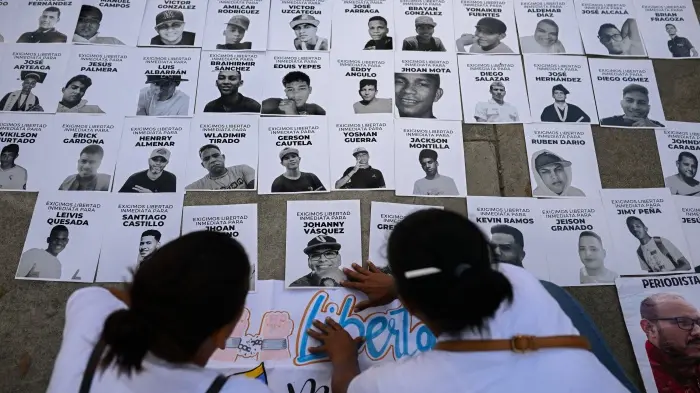For the third consecutive year, Colombia was the country with the highest number of homicides. In Guatemala, cases have increased fivefold, according to the latest Global Witness report.
Carmelina Yule Paví, 62, wanted to prevent children from Cauca from being recruited by illegal armed groups in Colombia. Felipe Xo Quib was a Guatemalan father and fisherman who opposed massive mining projects in the country due to the lack of prior consultation with the Q’eqchi’ people. Marcos Sánchez Perea tried to protect the forests of Puebla, Mexico, from the San Andrés Hueyacatitla Ejidal Commissariat. All were murdered to leave their work unfinished. To serve as a warning to those who would take up the mantle. In 2024, at least 146 social and environmental leaders from around the world disappeared or murdered. Four out of five of them (120) were Latin American activists, according to the latest Global Witness report. For the third consecutive year, Colombia was the country with the highest number of homicides. And Guatemala the nation in the world with the highest figures per capita. These new statistics bring the total number of such homicides between 2012 and 2024 to 2,253 — practically one every two days.
The report, titled Roots of Resistance and published Tuesday, once again highlights the risks faced by those who care for and protect our planet, particularly in Latin America and the Caribbean, a region that holds the unfortunate title of being the most dangerous continent for activism. Of the total number of deaths in the last 13 years, 1,619 (72%) occurred in this region.
Rachel Cox, senior campaign advisor at Global Witness, lamented in a statement that leaders are treated “like a nuisance.” “In a context dominated by rampant resource use, growing pressures on the environment, and the shrinking opportunity to limit global warming, those defending the environment and the land are treated as if they were a real nuisance, rather than canaries in a coal mine about to explode,” she stated. The study, presented just two months before COP30, to be held in Belém, the capital of the Brazilian Amazon region, highlights one question on the meeting’s agenda: How can we prevent an exodus of activists?
Colombia: one third of those murdered
Colombia once again leads the list with almost a third (48) of the world’s activism-related murders, 31 fewer than in 2023. It is followed by Guatemala with 20, Mexico (18), Brazil (12), the Philippines (7), Honduras (5), and Indonesia (5). Although Colombia has seen a notable decline in recent years, the country remains a major concern for experts like Astrid Torres, coordinator of the organization Somos Defensores, who insist on mobilizing all levels of the state apparatus to prevent the nation from becoming a graveyard for so many activists. “This is not just about what the national government does; governors and mayors have to act… These are 48 lives that could have been preserved if the state had done its job and heeded the early warnings issued by both social organizations and the Prosecutor’s Office itself,” she lamented by phone.
For the Colombian human rights defender, it is vital to read the data from an intersectional perspective that understands “beyond the numbers, the impact” of silenced leaders. In the Andean country, as in the rest of the world, Afro-descendant and Indigenous peoples and women are the most vulnerable, proportionally speaking. Indigenous peoples alone represent a third of the list, despite making up just 6% of the global population. Other people who continue to be disproportionately affected are peasants, as they suffered 35% of the attacks recorded in 2024 in the region.
The organization’s evidence suggests that defending land is the most lethal occupation. More than 68% of deaths in Latin America and the Caribbean (82 of 120) were related to disputes over access to land. Of the cases recorded worldwide, 29 were linked to mining and extractive industries; eight to logging; and four to agribusiness.
Guatemala, the most murders per capita
One of the biggest surprises in the report was Guatemala. This small Central American country of fewer than 19 million people has become the nation with the most assassinated activist leaders in the world per capita. Cases increased fivefold in just 365 days, going from four homicides in 2023 to 20 in 2024.
Brenda Guillén, coordinator of the Unit for the Protection of Human Rights Defenders (Udefegua), points out that this is the deadliest year so far this century, with the exception of 2018, when the Hogar Seguro case — a fire that killed 41 adolescents in a shelter in Guatemala — was included in the country’s records.
According to statistics from Udefegua, 89% of the cases that reach the Public Ministry are dismissed or archived. “And of the remaining 11%, few receive justice,” Guillén explained by phone. While the activist celebrates the steps taken by President Bernardo Arévalo’s government — such as the promotion of dialogue tables between Indigenous peoples and peasants — she regrets that it is not enough: “The executive branch failed to find more forceful actions against criminalization and eviction.”
For Guillén, these figures constitute “revenge” by the Guatemalan oligarchs and political opposition for the social movement and the 106-day strike to guarantee the inauguration of Arévalo and his cabinet in 2023. “This government owes a debt to Indigenous and peasant peoples. And they are being massacred,” she warned. Global Witness identified three groups as primarily responsible for the regional homicides: organized crime (42 cases), paramilitaries (17), and hitmen (13).
In 2024, at least four human rights defenders disappeared and remain unaccounted for in Chile (1), Honduras (1), Mexico (1), and the Philippines (1). The organization had been counting those killed and disappeared for more than six months on its lists since 2012. For the sake of clarity, the count is now being kept separately.
Guillén isn’t just saddened by these figures. She’s also critical of limited media coverage. “In Guatemala, society believes that insecurity has increased and that the 20 murdered leaders are a consequence of that, but that’s not the case. Defenders are targeted by a very specific group, but we’re oblivious to the danger posed by protecting our territories.” (https://english.elpais.com/international/2025-09-17/four-out-of-five-activists-assassinated-in-2024-were-latin-american.html)





































